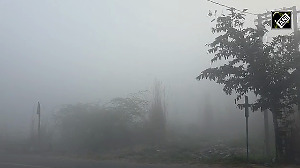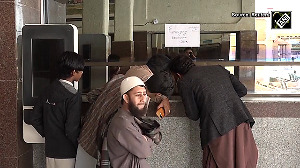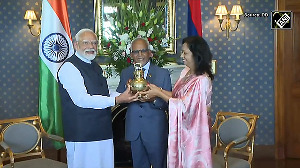The Reserve Bank of India has said that banks are 'cornering' customer surplus by charging high fees on inter-bank ATM transactions in the name of recovering technology costs. Also, banks forming various ATM platforms are a tendency towards cartelisation.
The analysis of expenses incurred for serving customer at the counter and ATMs shows that costs are much less at ATMs, RBI Executive Director R B Burman said, addressing banking technology conference organised by Indian Bank's Association on Wednesday.
Customers get these services free over the counter. Charging them (for transactions at ATMs) amounts to cornering of consumer surplus in the name of cost on technology, while the costs should be lower due to efficiency gains, Burman said.
ATMs, Automated Teller Machines, are being increasingly used as substitute for cash delivery at counter, money transfer and balance inquiry process. The customers place deposits at lower rate with banks and they expect to get certain services free.
"Should public policy remain silent when market segmentation and cartelisation is the tendency to corner consumer surplus? The regulation of the fee to be charged to customers for use of ATM is expected to promote socially optimal spread of shared network (of ATM), Burman said.
The charges levied on the customers vary from bank to bank. They also vary according to the ATM network that is used for the transaction. Consequently, a customer is not aware (before hand), how much he\she pays for a particular ATM transaction, especially when using ATM.
This generally discourages the customer from using the ATMs of other banks. Enhanced and cost-effective access to ATMs plays an important role in technology-based financial inclusion, according to RBI.
In December 2007, RBI through discussion paper has suggested that customer of one bank be allowed free use of ATMs of other banks, including cash withdrawals from April 1, 2009. Plus use of ATMs of own banks for any purpose and use of other bank ATMs for balance inquiries should be free with immediate effect.
A RBI official said some banks who have made substantial investments to rollout large ATMs network have a valid point to look for recovering them. But they could recoup costs by charging other banks instead levying fee on ATMs users. These charges (inter-bank) are not regulated by RBI.
The spread of ATM network is uneven. Some places there is clustering of 3-4 ATMs, while other places in rural areas remain uncovered, he said. At present, banks in India have deployed more than 31,000 ATMs.







 © 2025
© 2025